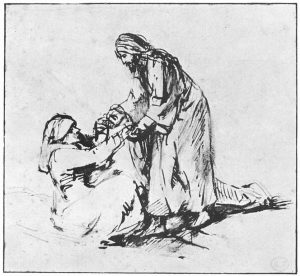Thoughts on Sunday’s Lessons for Feb. 7, 2021
First Reading: Isaiah 40:21-31
God is very large. We are very small. God is very powerful. We are very weak.

Christ Healing Peter’s Mother-in-Law (c.1650-1660), pen drawing with watercolor wash, by Rembrandt Harmenszoon van Rijn ((1606–1669). Fondation Custodia, Paris. (Click image to enlarge.)
In Sunday’s first reading, the Prophet Iāsaiah musters striking poetic language that likens the people to grasshoppers and their earthly rulers to dandelion puffs blown apart in the wind. As the people begin to ponder the challenges of return from exile, Isaiah portrays a transcendent God who is far beyond our imagining. And yet, the prophet foretells, this mighty, eternal and all-powerful God will lift us up on eagles’ wings and give us the power and the strength to follow God’s ways.
Psalm: Psalm 147:1-12, 21c
Echoing Isaiah’s message in one of the six exultant hymns of praise that conclude the book of Psalms, the Psalmist celebrates the glory of the powerful, all-knowing God who counts and names even the stars of heaven, and who has guided the people home from exile and bound their wounds. God is unimpressed by the powerful and the strong, the Psalmist sings, but gently tends the broken and the brokenhearted. God lifts up the lowly, but casts the wicked to the ground, we sing, celebrating a liberating theological idea that we hear again in the Song of Mary and the teaching of Jesus.
Second Reading: 1 Corinthians 9:16-23
It’s tempting to argue with Paul’s message in these verses. Even for a worthy purpose, it’s not good to pretend to be something you’re not. But that’s not really what he is saying. Paul is getting at something deeper than just being a moral chameleon when he claims to have been “all things to all people.” As in last week’s discussion about eating meat sacrificed to idols when Paul warned Christians not to be a stumbling block to others, Paul urges the people of Corinth to love one another and work together. It doesn’t matter whether you’re Jewish, Gentile, strong or weak, he tells the people. Honor each other in your differences. Then unite to share the good news of the Gospel.
Gospel: Mark 1:29-39
The season after Epiphany is ending early this year because Easter, and Lent before it, fall relatively early. In this Sunday’s Gospel, we’ll hear another of Mark’s accounts of Jesus healing, throwing out demons, and telling the Good News before we move along to the Transfiguration, Ash Wednesday and Lent. In this Gospel passage, Jesus goes from the synagogue at Capernaum to the home of his friends Simon and Andrew, where he cures Simon’s mother-in-law of a fever, a scary symptom in those days before modern medicine. Restored to health and strength, she gets up to serve them. The Greek word for “serve” used here is “διηκόνει,” from which we get the word “deacon.” The same word is later used in Acts to name those who came forward to support the Apostles who were busy spreading the Gospel. Just as Simon’s mother-in-law served Jesus and the apostles, deacons vow to serve all people, particularly the poor, the weak, the sick, and the lonely.
